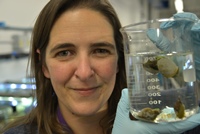Can an embryo learn?

Dr. Sarah Dalesman
08 December 2014
Can an embryo learn?
If you’re a snail embryo it certainly seems so!
Pond snails are able to sense chemicals released by their predators whilst they are still embryos in the egg and alter their behaviour accordingly.
Researchers at Aberystwyth University, University of Exeter and University of Plymouth have now shown that when snails are exposed to predator smell during this very early developmental stage, they are better able to avoid predatory fish once they hatch.
This ‘pre-programmed’ response may be extremely important for snails to be able to survive just after hatching when they are very small and vulnerable.
Their findings are published online in the journal Freshwater Biology.
Pond snails are extremely important to freshwater environments, helping to control the growth of plants which can clog up our rivers.
They are also under threat from invasive predators including the killer shrimp and signal crayfish.
Understanding how snails are able to learn about predators at different life stages, from embryo to adult, will give us a good indication about how capable they may be of surviving under these increasingly risky conditions.
To get an idea of how snails respond to predators, the team looked at how pond snails, Lymnaea stagnalis, responded to smell from a predatory fish, tench.
The snails were exposed to predator smell throughout their embryonic development in egg capsules.
Once they hatched out, they were kept in a predator-free environment for a week, and then tested for how they respond to predator smell.
Snails exposed to the predator smell as embryos strongly responded to the smell when they re-encountered it as juveniles, crawling out of the water to escape the potential predator.
The lead author Dr Sarah Dalesman (Leverhulme Trust Early Career Fellow at Aberystwyth University) said; “We were quite surprised at how well the snails were able to learn during this very early phase of development.”
The ability to respond to potential predators while still in the egg may be extremely important in allowing young vulnerable snails to survive.
“We also found embryos exposed to the predator smell hatched out at a smaller size than those kept in predator-free conditions”. This mirrors effects of stress on development in mammals, including humans, where foetuses of stressed mothers are often smaller at birth than their non-stressed counterparts.
Dr. Simon Rundle (University of Plymouth) stated that; “One of the most important findings in this study was that there appeared to be a genetic component to the snails’ behaviour, with those animals whose grandparents had experienced fish predators in the wild showing the biggest response”.
This research work was funded by a Leverhulme Trust Early Career Fellowship (Dr. Dalesman) and an undergraduate student scholarship from the Association for the Study of Animal Behaviour (Angharad Thomas).



